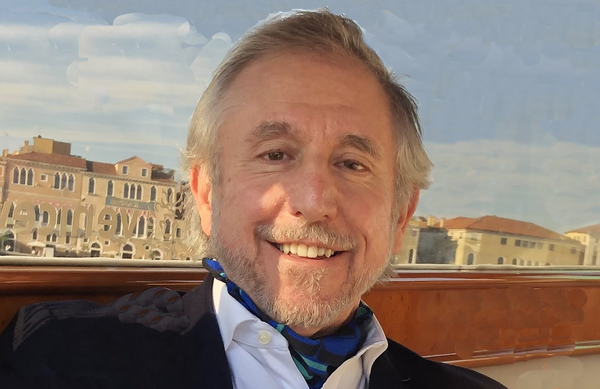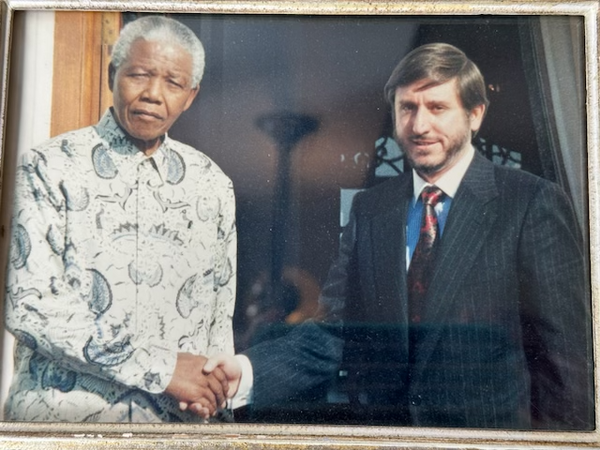

As a leading expert in international intellectual property, Professor Frederick Mostert has advised individuals from all walks of life, including former South African President Nelson Mandela, the Shaolin Monks in China, and fashion designer Stella McCartney. He is passionate about a wide range of issues including persona and image rights, free speech, social media, and digital brand reputation management. He is currently a professor of practice at Notre Dame’s London Law Programme, where he teaches a course on intellectual property in the cyberworld. He is also a professor of practice at the Dickson Poon School of Law at King’s College London and a visiting professor at Roma Tre University in Rome. With his groundbreaking research and global impact on intellectual property and digital rights across diverse sectors, Mostert embodies the very essence of Notre Dame Law School’s mission to cultivate a “different kind of lawyer” — one who leads with both passion and purpose.

President Nelson Mandela
Mostert had the honor of working on a pro bono project for former South African President Nelson Mandela. He spearheaded an initiative at a United Nations Agency to secure the protection of President Mandela’s name and likeness as a State Emblem of South Africa, under Article 6ter of the Paris Convention.
First Nations’ Project in Canada
Currently, Mostert is involved pro bono on a First Nations’ lead project in Canada. The project will enable the First Nations people in Canada, and potentially indigenous people in other parts of the world, to develop their own country code internet domain. The project’s goal is to achieve “digital sovereignty”; address intellectual property rights, and ownership of culture and identity information; and contribute to humanity and business enterprises using a bridge from Web2 to Web3.
Allen Edzerza, the First Nations lead of this project, said, “Frederick’s international work and experience has been very helpful in the design and development of this project. It is clear to me that Frederick sees the potential of a country code domain owned and operated by First Nations, as a necessary tool required to build capacity to fully implement First Nation sovereign governments.”
Mostert is excited to have Notre Dame Law School become involved in this project.

Shaolin Monks
Mostert has worked on a pro bono project for the Shaolin Monks in China after discovering that counterfeit monks were engaged in inauthentic Shaolin Kung Fu performances, threating the integrity of the Shaolin tradition. He also facilitated the creation of a new logo with the help of a prominent international designer.
Image Rights
Mostert has advised public figures, actors, and creative spirits such as designers and chefs. He believes image rights are closely linked in the digital world to human rights premised on the idea that human autonomy and dignity are worthy of protection.
The proliferation of deepfakes, synthetic media, and avatars require a new approach to image rights. Mostert posits that all natural persons have an ‘image’ that automatically arises at birth. In principle, this means that any individual on an equal footing — regardless of whether they are famous — is entitled to protect their image from unauthorized use. During his current tenure in Rome, he will be researching and working on a follow-up article on international image rights in the digital world.
Fashion Law
Mostert worked with fashion designer Stella McCartney after she joined Chloe. “I often think what gets me out of bed in the mornings is knowing that I will be working with creative individuals who inspire me immensely,” he said.
During the dot-com era, he worked with a United Nations Agency, the World Intellectual Property Organization, to assist in developing the formation of an international domain name arbitration system (the UDRP). Mostert notes, “This experience enlightened me to the crucial connection between domain names, the digital world, and fashion law.”

Troll Emoji
In addition to his endeavors in the legal field, Mostert is a co-developer of the international Unicode “Troll” emoji.
Experiential Learning
Mostert is a passionate advocate for interdisciplinary learning and experiential teaching in law. In the London Law Programme, he has taken his students beyond the classroom, organizing field trips to places such as the headquarters of a major internet company and the Victoria and Albert Museum. At the museum, students met with the General Counsel to explore the copyright licensing behind Michelangelo’s David, learning how the iconic statue is used in films. Mostert also brings the real world into his classroom, inviting guest lecturers such as the former police commissioner of the City of London Police.
Students have praised Mostert’s teaching for its depth, relevance, and personal engagement. Third-year law student Margot Calmar said, “Professor Mostert is a rare combination of brilliance and warmth. He takes the time to share his own experience and his remarkable network in an approachable and fascinating way. It is not often that a lawyer with that extensive of a career takes the time to not only teach, but really get to know his students. It was a highlight of London for many of us.”

Recent Notre Dame Law graduate Alyssa Desouza echoed that sentiment: “Professor Mostert was one of my favorite teachers at Notre Dame Law School. Not only is he a star in the intellectual property space; he is also compassionate, encouraging, and personally invested in his students’ success. He strives to offer his students unique class experiences,” she said. “I will always remember chatting with the legal team at Alibaba’s London headquarters and being toured around the Victoria and Albert Museum by its General Counsel.”
Mostert’s approach exemplifies his belief in teaching through real-world exposure, preparing students to be both knowledgeable and adaptable as they step into the complexities of legal practice.
A Different Kind of Lawyer
Mostert believes being a “different kind of lawyer” means gaining a true understanding of his clients’ requirements by practicing “deep listening.” “You have to think of the human being behind the issues and take a holistic approach to supporting them,” he emphasized.
Mostert has seen these values in action in the students, noting that they have adopted the holistic mindset necessary to become transformative lawyers and forces for good. He is deeply impressed with Notre Dame Law School’s commitment to its students, highlighting how its teaching process is exceptional because of its comprehensive, values-driven approach.
“The students are sympathetic, understanding, thoughtful, and compassionate. I have never seen a university so focused not only on making students excellent lawyers in the technical sense, but also on shaping them into practicing lawyers in a holistic way.”
Through his teaching experience at Notre Dame, Mostert sees a future generation of lawyers who will lead with both expertise and empathy, embodying the Law School's mission to be a “different kind of lawyer” in a complex world.
Originally published by at law.nd.edu on September 11, 2024.